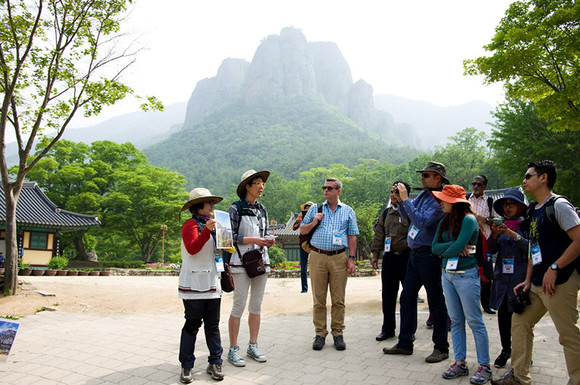Training empowers developing country scientists to promote UNESCO Global Geoparks
24.06.2016Geoparks are gaining increased global prominence following last year’s General Conference declaration giving 120 of them official UNESCO status. As communities around the world build their own nomination files for future potential inclusion on the Global Geopark list, there is a growing need for scientists who understand the concept and the fundamental principles behind it.
With that in mind, the International School for Geoscience Resources, Korea Institute of Geoscience and Mineral Resources (KIGAM) organized a two-week intensive training course on “Aspiring Geoparks: Development and Preparation”.
 Scientists from developing countries were the main focus of the training which came under a wider agreement between UNESCO Bangkok and KIGAM to strengthen and promote geoscience in the Asia-Pacific region, with a particular emphasis on capacity-building pertaining to the promotion of UNESCO Global Geoparks. The training was also conducted in partnership with the Coordinating Committee for Geoscience Programmes in East and Southeast Asia (CCOP).
Scientists from developing countries were the main focus of the training which came under a wider agreement between UNESCO Bangkok and KIGAM to strengthen and promote geoscience in the Asia-Pacific region, with a particular emphasis on capacity-building pertaining to the promotion of UNESCO Global Geoparks. The training was also conducted in partnership with the Coordinating Committee for Geoscience Programmes in East and Southeast Asia (CCOP).
One of the course’s participants, Visky Afrida Pungkisari from Indonesia’s Center for Geological Survey, said that the training offered a thorough grounding in the geopark concept and empowered participants to take that message back to their home countries.
“We were also able to exchange knowledge with other participants about the challenges associated with developing geoparks,” she said. “After this training we are better equipped to inform stakeholders, including local government officials and community members, about geoparks to motivate them and ensure that they have a proper picture of what they involve.”
Vannapha Phommacahnh from Lao PDR also gained a new perspective from the training. “My colleague and I better understand and the point of a geopark and how they are important for a country’s development.”
 Seventeen young scientists from nine countries (Cambodia, Laos PDR, Indonesia, Malaysia, Myanmar, Philippines, Thailand and Viet Nam as well as Ecuador from Latin America) attended the first part of the training, while an additional 70, including local experts from the Korean National Geopark Committee, KIGAM, geopark interpreters and local officials, attended the symposium.
Seventeen young scientists from nine countries (Cambodia, Laos PDR, Indonesia, Malaysia, Myanmar, Philippines, Thailand and Viet Nam as well as Ecuador from Latin America) attended the first part of the training, while an additional 70, including local experts from the Korean National Geopark Committee, KIGAM, geopark interpreters and local officials, attended the symposium.
The course was designed for young geoscientists working on geoparks, geo-heritage or national parks, who wanted to develop their expertise and skills related to the UNESCO Global Geopark concept. This course provided the opportunity to enhance the expertise of geopark or geological heritage site staff, researchers, or managers, especially from countries that are developing geoparks.
Geoparks and Sciences: UNESCO Global Geoparks are territories whose geodiversity and associated geological heritage are of international relevance. Scientific works on/for Geoparks should not only be focused on earth sciences but also in all other disciplines of the natural, social and human sciences, which contribute to the advancement of our knowledge about the Earth and its processes as well as its links to humanity.
UNESCO’s Global Geoparks align well with the goals of the Agenda for Sustainable Development, particularly because of their focus on the three dimensions of sustainable development – economic, environmental and social –making it particularly important for their development to be supported in areas such as Africa, Southeast Asia, Latin America and the Caribbean.


